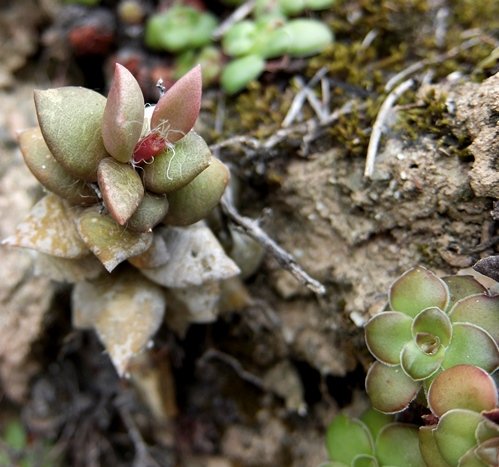Hairstyle contrast between succulents

Hairs on plants look different as can be expected, for they serve different purposes. In some cases, hairs persist on plants although their functionality may be disappearing or in transition. Plant hairs (and scales) are botanically called trichomes.
A hairy indumentum may be worn like a garment or blanket, even seasonally, protecting the plant against drying out or temperature extremes. Branched, forked or stellate (star-like) hairs increase the coverage of a limited number of simple hairs. Coarse hairs, the slender-pointed ones and particularly prickly and stinging ones serve to discourage herbivores from eating the bearer plant or its parts. Hairs may predominate on lower surfaces of leaves, maybe serving in water retention.
Glandular hairs secrete sticky substances that may trap, deter or forewarn small insects and prevent them from make mischief. Silvery hairs may reflect undue sunlight and cool the plant, while dark hairs will retain heat. Hooked hairs, especially ones with multiple hooks, allow plant parts to break off for transportation when catching onto passersby, allowing new plants to grow wherever parts are dropped off. Such hairs on fruits serve in seed dispersal. “Hairs on air” bring about wind transportation, as in the pappus hairs of daisy fruits.
Hippie versus army style in hair is also an issue among plants.
In picture, the flat rosettes of the Crassula orbicularis plants have smooth, hairless blades fringed with hairs neatly along their margins. Such ciliate fringes are sometimes hairs, sometimes papillae. The Anacampseros telephiastrum plant in picture sharing the quiet neighbourhood with the crassulas has only few, thick, curly hairs, the stipules growing dishevelled from next to the leaf bases.
What for? Maybe to collect water during parched times, as in Trichodiadema species. The Little Karoo where these succulents get thirsty continually brings water issues to the fore. For this is also the region where the Afrikaans poet and author, CJ Langenhoven, practised as a lawyer, very often in water related disputes among farmers or land owners (www.backyardnature.net).

